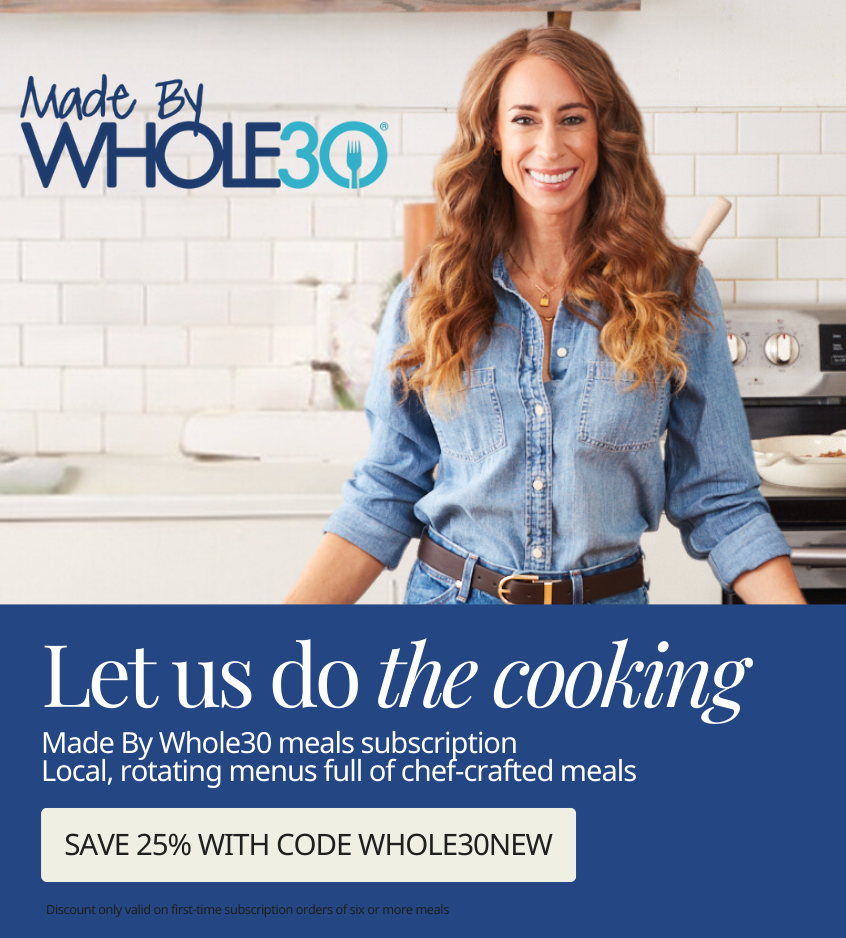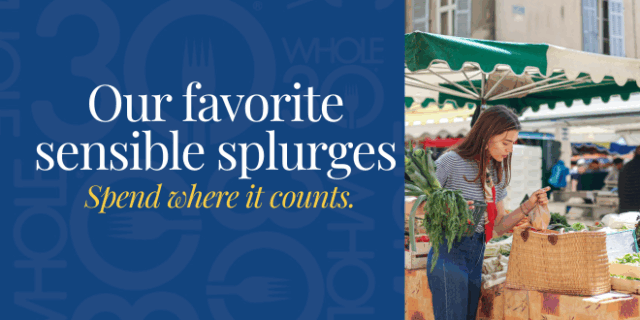As anyone who has completed our program knows, the Whole30 is physically, mentally, and emotionally challenging. (Yes, we say “this is not hard,” but in the The Whole30, we also say, “P.S., we know this is hard.”) Still, some throw other challenging goals into the ring right along with completing the Whole30: “I’m going to do the Whole30 and give up coffee for 30 days,” “I’m doing the Whole30 + quitting smoking,” or “I’m doing the Whole30 plus exercise.” As we’ve observed over the years, this can be a highly effective strategy for generating major health improvements quickly … or it can totally backfire, leaving you frustrated, full of self-doubt, and less healthy than when you started. So how do you know if doing a Whole30-Plus is right for you?
Look Beyond the Initial Excitement
First, when it comes to your “plus,” there has to be a clear health goal in mind. As Melissa often discusses, don’t add something onto your Whole30 just to make it more “hard-core.” If you believe coffee may be making you less healthy, by all means, experiment with it Whole30-style. But don’t give it up just so you can brag to your friends that you did a harder version of the Whole30. That is missing the point entirely, and may actually work against you in the long run. (See below.) Two, make sure you have an intrinsic motivation for this addition to your Whole30 program. If the idea isn’t coming from you, it’s not very likely to stick, especially if there’s an emotional aspect to the change (like giving up smoking). Maybe your Mom thinks you should give up cigarettes at the same time as your Whole30, but unless you think that’s the best way to tackle it, you’ll end up resenting your Mom, the program, or both… and be more likely to abandon all efforts (or fail because you took on too much at once). Three, and this is important… make sure you see these efforts as one big goal, not two goals you’re trying to accomplish at the same time. Why? Because of a process willpower expert Roy F. Baumeister calls “goal shielding.” Turns out your brain can’t effectively manage competing goals of equal importance, and will force you to focus on one goal while “shielding” you from focusing on the other. Translation: the more committed you are to one goal, the more the brain diverts your focus away from other efforts, to help you achieve Priority #1. If you look at these efforts as separate and distinct (I’ll finish the Whole30, and I’ll also quit smoking), one or the other will suffer. If you can honestly see these as one and the same (my Whole30 embraces the “no tobacco” rule), your brain will allow you to devote all your attention and energy to accomplishing the big picture, and you’ll be far more likely to succeed with everything. Finally, make sure you have capacity (both from a physical/emotional/psychological perspective and a practical perspective) to add something to what can be a stressful program. Do you really think you can deal with the energy slumps that come from blood sugar dysregulation and a lack of caffeine? (Can your boss, or your significant other?) Do you really have enough time in your day to add lots of meal prep and daily exercise? Have you prepared for the social challenges that come with no alcohol, no desserts, and no cigarettes? These changes are supposed to make you healthier, and you already know the process will be stressful. But if that stress takes more from your health bank than it adds due to your context (life stress, financial stress, social pressures, etc.), you’ll be moving in the wrong direction. In this instance, you’d be better off taking on less while accomplishing more.
Rethinking a Whole30-Plus
If you’re second-guessing your plan to do a Whole30-Plus, that’s probably a good thing! These questions were meant to help you see beyond the initial excitement of tackling multiple goals at once, and take into consideration some of the hidden traps. In fact, we can see three major advantages to deciding to separate these goals out into singular efforts made at different times. First, if you choose to start with the Whole30, you may find that getting back in control of the food you eat (and feeling so much better for it) will give you so much self-confidence and self-efficacy that it spills into every other area of your life, making other goals seem even more attainable. In fact, you may just find yourself heading in the direction of less coffee, fewer cigarettes, or more healthy movement as a natural side effect of your new healthy eating plan. Second, the new healthy habits you learned on the Whole30 will automatically translate into your next health goal. Learning how to plan for and deal with stressful situations, talk to family and friends about your goals, distract yourself from cravings, and reward yourself in a healthier way will make any other effort you take on that much easier to manage, because you’ve successfully navigated similar challenges before. Finally, feeling better, being happier, eliminating cravings, and reducing your overall stress (as tends to happen on the Whole30) will help you take on another stressful challenge like giving up an addictive substance with more of a buffer; a more robust health bank account. Having that extra capacity will allow you to handle the challenges of your next health goal with more grace and ease, increasing your chances of success.
Choose Your Own Adventure
Whether you decide to take on a Whole30-Plus or split these health efforts out into individual goals is entirely up to you—but we hope we’ve given you some things to consider here, and that the support and resources we provide for the Whole30 are just as helpful and translate effectively into other areas of your life. After all, the Whole30 promises to change your life… and food is just the beginning.
















